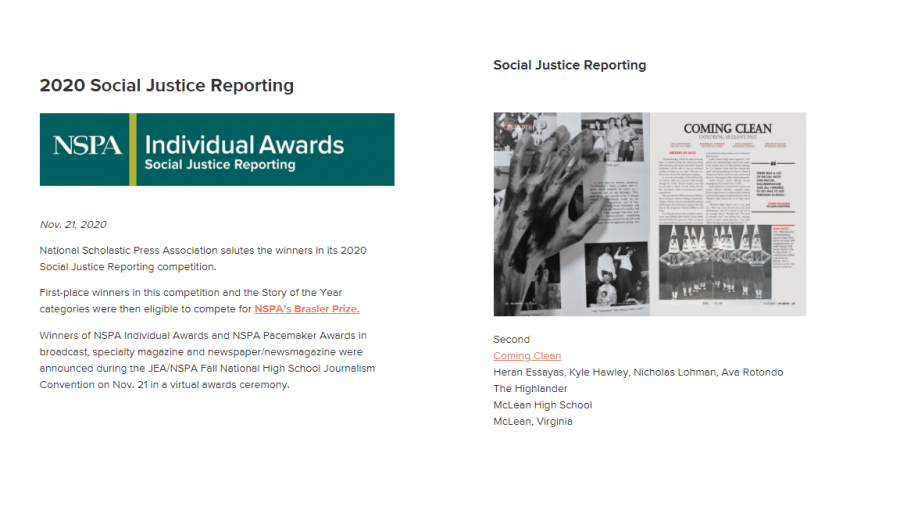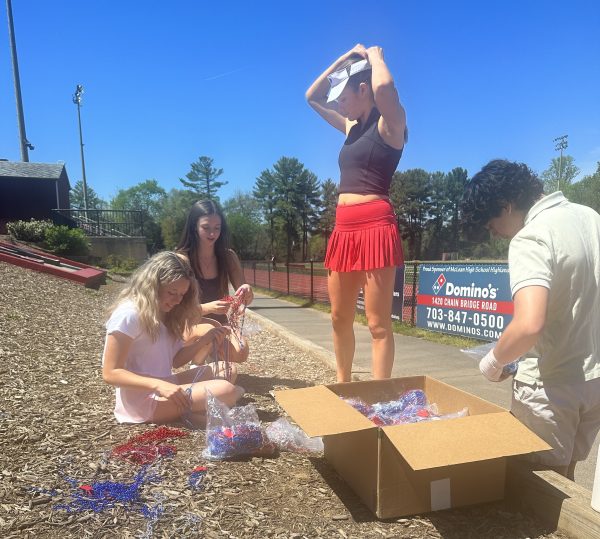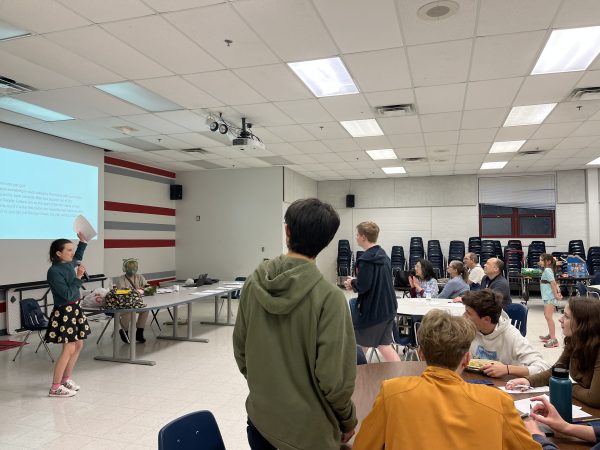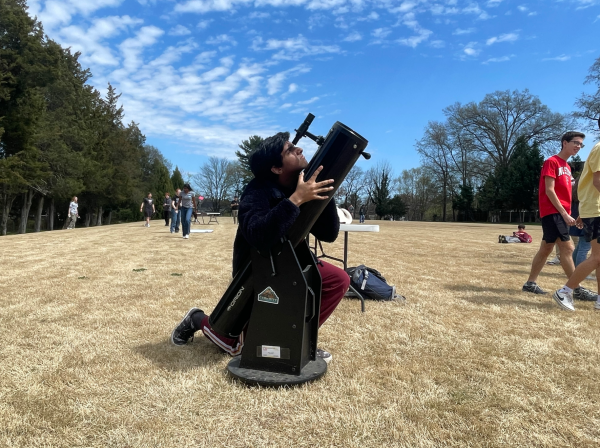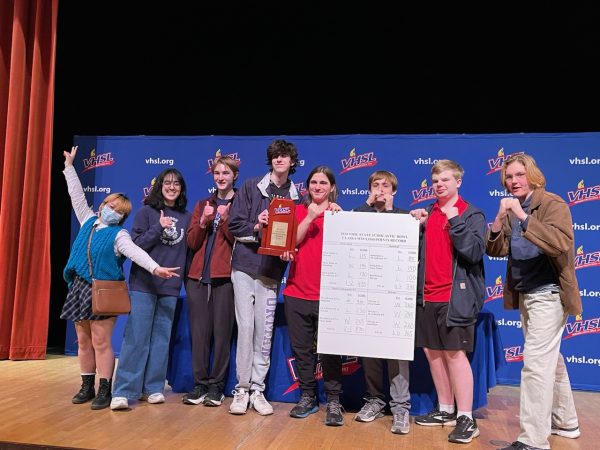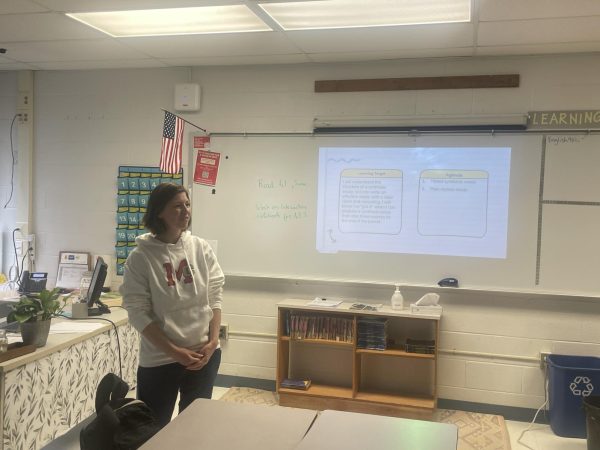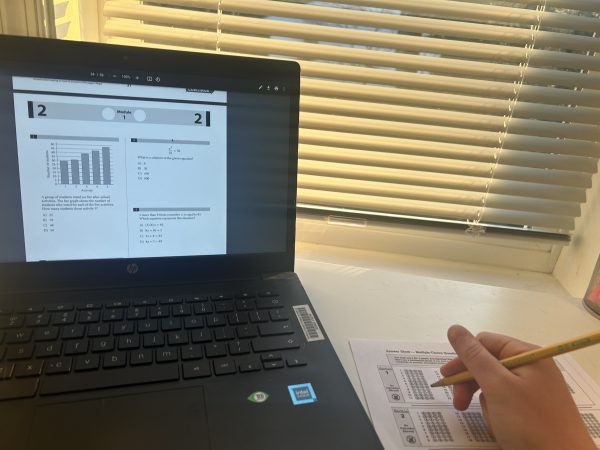The Highlander newsmagazine wins National Scholastic Press Association awards
Highlander earns Pacemaker distinction, staff members receive individual awards in five categories
Proudly Highlander – The Highlander’s “Coming Clean” is awarded second place for the 2020 NSPA Social Justice Reporting award through the official website. The article has been acknowledged in a nationwide scale, and it’s regarded as a ‘first step for a long-term reform at McLean High School.’
The National Scholastic Press Association (NSPA) honored The Highlander newsmagazine with the Pacemaker distinction on Nov. 21 and honored individual Highlander staff members for their work in the categories of Social Justice Reporting, Story of the Year: News Story, Newsmagazine Cover, Portfolio: Artist of the Year and Local Climate Change Reporting.
Among these winners, “Coming Clean,” an in-depth report about race relations at McLean High School written by Heran Essayas, Kyle Hawley, Nicholas Lohman and Ava Rotondo, was announced as the second place winner for NSPA’s 2020 Social Justice Reporting competition.
“I was very happy when I heard that we received the award,” said Ava Rotondo, who was the editor-in-chief of The Highlander last year. “This was one of the articles we put the most effort into last year, so seeing it recognized on a national level felt great.”
The article explored the pattern of systematic racism that existed at McLean High School for decades, along with school segregation and discriminatory housing policies and racist practices in Fairfax County.
“The story of “Coming Clean” started when we were looking into the movement that a lot of universities were doing—looking into their racist kind of histories,” Rotondo said. “Universities looking into the racist past of the school and then figuring out how they can foster a better community for all students [made us] look into our own legacy.”
To obtain information about McLean’s past, the reporters went through Fairfax County websites and all of the school’s yearbooks from the 1950s. They ended up finding many images of blackface, which were key to the article/
“The most striking thing that was featured in the article were the images of blackface that we found in the yearbooks,” said Nicholas Lohman, last year’s other Editor-In-Chief who also participated in the article. “The yearbook [also] highlighted the general legacy of school segregation that had been left at McLean.”
Since the topic of the article was sensitive, the group had put extra effort to fact-check interviews and find relevant statistics.
“I think…the article really stood out…[because] we had the numbers and the quotes to back up them and actually show what people were thinking,” Lohman said. “The specific quotes were harder to obtain than the quantitative information, but I think that’s what really ended up painting the picture.”
As the article was published in October 2019, before the Black Lives Matter Movement gained momentum again, the group predicted that the article’s unique angle would create a little bit of resistance in the community.
“We were very careful with our wording and with what we were saying,” Rotondo said. “[We wanted] to make sure that the article was not only neutral but compassionate toward every single reader.”
Receiving the award is almost like fuel for me to keep on pushing and to continue with journalism.
— Nicholas Lohman
Not every step of the writing process was a smooth one. The reporters had to make decisions on their own regarding the publication of images, and they experienced some external pressure even before its publication.
“The fact that we found images of blackface was in itself surprising, and we then had to grapple with the decision of whether to publish those images,” Rotondo said. “[And] the school board actually emailed us and asked to see a copy before publication, but we had to make the decision to say ‘no’ to continue to uphold our integrity as a publication.”
After being published and distributed to McLean students and staff, the article started lots of conversations, and even received direct criticisms from the community.
“Even teachers at McLean used class time to point out all the flaws they thought existed in the article,” Lohman said. “But our job [as journalists] is just to provide them with information and hopefully direct their attention towards something that they haven’t thought about before so I think the conversation [itself] was where the victory was for us.”
Despite all the criticisms and frustrations, the authors of “Coming Clean” say they learned a lot through writing the article.
“The article was very eye opening because I learned that not everything [a journalist] publishes will be liked by everyone, and that isn’t necessarily a bad thing,” Rotondo said. “It also made me realize how important fact checking and publishing stuff with integrity are too.”
“Coming Clean” being acknowledged by a national organization made Lohman and Rotondo proud. It was also helpful for them to continue their journalistic careers.
“Receiving the award is almost like fuel for me to keep on pushing and to continue with journalism and just do better each time,” Lohman said. “When the semesters become more and more normal and I get settled in, I’m going to take the reins back up and work actively as a news and features writer for my school.”
The reporters also give their thanks to their adviser, Lindsay Benedict, who they credit with encouraging them to continue.
“Ms. B was incredible throughout this process, especially when we had to make the decision whether to send a copy to the school board before publication,” Rotondo said. “She let us make our own decisions, and I think that helped us grow tremendously as journalists because she let us learn the lesson that, as journalists, we sometimes have to make tough decisions to uphold our integrity.”
Further information about the NSPA awards can be found at http://studentpress.org/nspa/awards-2/
Your donation supports the McLean High School's independent, award-winning news publication.



